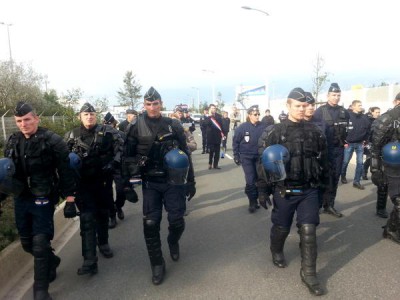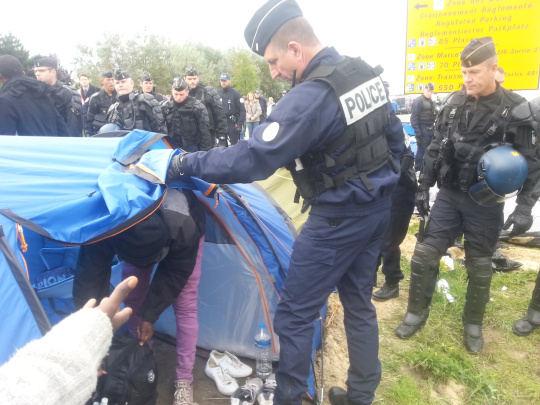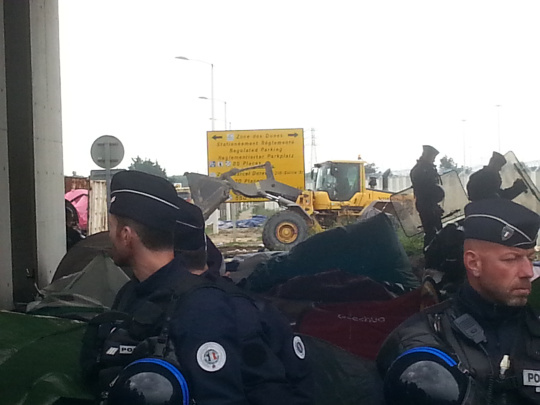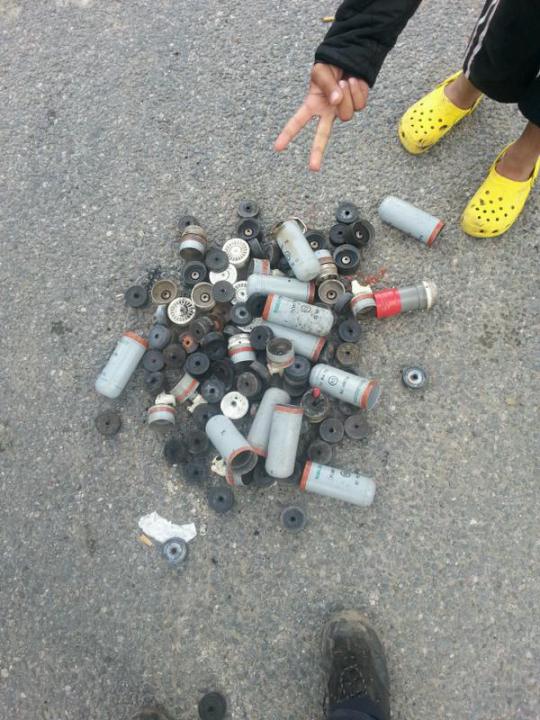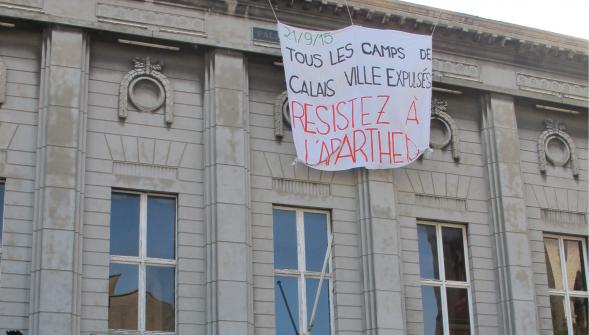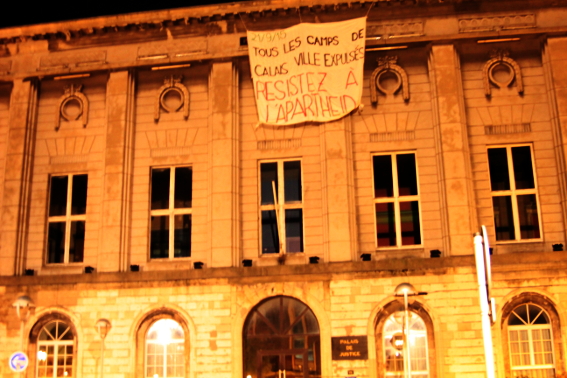Last week the French police evicted four migrant camps in Calais. These were the only camps in the town itself. Monday’s evictions made it clear that the migrant population in Calais would only be allowed to live in the “jungle”, an area of land on the edge of the town (note: the word ‘jungle’ comes from the Pashto ‘dzangal’, meaning ‘forest’. The name comes from the Pashtun Jungle, a forested area in Calais occupied by Afghans back in 2009, but it is no coincidence that the media has continued to use this term to describe the camps…). The current camp population has swollen to 4000 people due to tightened security at the border and the greater difficulties crossing; 3 people have died trying to cross in the past two weeks. This article is gathered from Calais Migrant Solidarity and gives an update on the latest situation over there.
At around 7.30am on 21st September, the largest of the three camps in town, inhabited by up to 300 Syrians, was evicted in traditional Calais style. A large contingent of Gendarmes, Police Nationale and BAC (undercover police) woke people up, giving them very little time to gather their belongings, and told them to go to the Jungle, the former landfill site on the outskirts of the town that serves as the only place where migrants will be tolerated. The Syrians chanted “no Jungle, no Jungle!” and sat down. They also linked arms across a bridge. The police attacked and pepper sprayed them and they moved en masse in the only direction open to them: the jungle.
They were frogmarched the 2.5 miles to the Jungle with a convoy of Gendarmes behind them. One man pictured below wearing a suit and a tricolore sash, appeared to be calling the shots all day. For many of the Syrians, this was their first time at the camp and they were unsure what to do.
On arriving at the Jungle, the police turned their attention to the dozens of tents pitched by the new arrivals at the entrance and told people to move everything back to the Jungle. A crowd from the Jungle gathered in front of the police lines. Giving people almost no notice, the police started ripping up tents and pushing people back. Some woke up to the site of armoured police dismantling their shelters from around them. We helped people save what they could, but many personal possessions were lost in the police violence. At least 6 people lost their passports, some lost money, phones with vital contacts on, others photos or details of dead or missing family. There were attempts to negotiate for some people to be allowed through the police lines to save their passports, but they were met with the stony glares of the automatons in riot gear. Diggers and council workers appeared beyond police lines to destroy and load the tents and belongings onto trucks for the municipal dump (no doubt the site of the next jungle once the current one becomes completely uninhabitable). No-one was allowed to go anywhere for several hours. In the face of this overwhelming and ridiculous show of state force, people showed defiance with chanting, singing and dancing that echoed loud under the bridge. The diversity and vibrancy of the crowd contrasted starkly with the line of fascists in navy blue boiler suits brandishing guns, batons and shields.
We went to the dump soon after to try and retrieve some belongings but found everything in a giant rubbish compactor already mixed up other waste, and were unable to save anything.
We later learnt that the two other, smaller camps in town were also evicted today, meaning that there are no known migrant camps in Calais other than the jungle. It is clear that the 20 hectares or so that increasingly resembles a swamp is the limits of what will be tolerated for migrants in Calais. Large National Front posters are currently plastered all around the town. What the government most despises here is that migrants show their faces in the town centre and in the tourist areas, which is why the Jungle exists at all.
The next day there was a traffic jam on the motorway near the jungle. Many people went there to try and get into the lorries. The police reacted by pushing them back in the jungle with use of batons and spray, and they fired tear gas on the jungle itself. At least 10 salvos of tear gas were fired indiscriminately into jungle near the part of the camp where many Eritrean women live, there are also children in that part of the jungle, and one person was hospitalised also having been shot in the stomach with a rubber bullet. People fought back with stones, video (on Facebook) here.
[via Rabble, September 30th]
Update:
On Sunday morning a banner was found hanging from the court house in central Calais. It read “21/9/15: All the camps in Calais evicted: Fight Apartheid”
